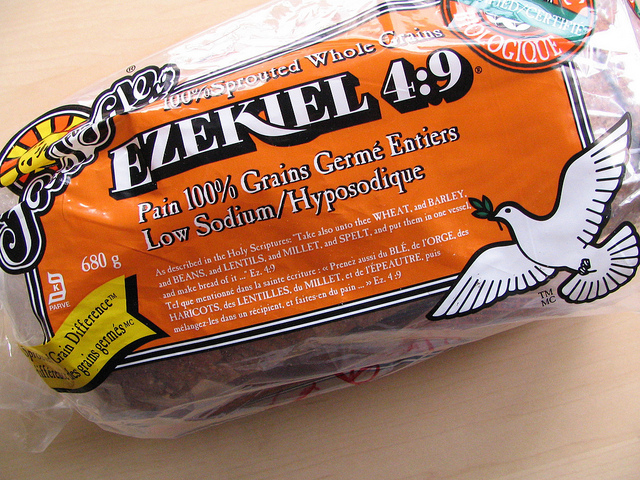
It’s complicated. I got fooled, suckered, bamboozled…whatever you want to call it. You would think as a nutritionist that I’m never fooled when it comes to food labels. But I’m here to say that it happened to me!
This post is proof that no one, not even a trained nutritionist, is above having the wool pulled over their eyes. I humbly share my recent error in the hopes that it will keep you from making the same mistake I did!
A colleague recently posted on Facebook about how much of an enthusiastic fan she is of the brand Food For Life, specifically their Ezekiel 4:9 bread. Their baked products use sprouted grain and seeds as the main ingredients. Sprouted grains enhance digestibility and assimilation of the nutrients including minerals (calcium, magnesium, iron, copper and zinc) by inactivating enzyme inhibitors. Richer in vitamin C, vitamin B2 – riboflavin, vitamin B5 – pantothenic acid & vitamin B6 – pyridoxine than non-sprouted grains. A wonderful example of a whole food with nothing removed and nothing added or enriched.
I am a Sally Fallon / Weston A. Price advocate and agree with one of their core beliefs which is that that we need to learn how to actually prepare the food we feed our family to promote health not disease. The enemies of good health are the processed foods that flood our grocery stores these days. These foods contain nothing nourishing for us and our families; they’re heavily processed and refined, loaded with dozens of additives, dyes, preservatives, and chemicals.
If you regularly read this blog, then you know how much I love making yummy meals at home. But buying raw grains, soaking them, sprouting them, drying them, and grinding into flour is beyond my scope of expertise and I also lack the time to devote to it. So I buy and tell many of my clients to buy sprouted flours and grains from natural grocers whenever possible. But if you have the time and/or interest in learning how to make your own flours then check out Sally Fallon’s book, Nourishing Traditions. It’s a great book that I think everyone should own or at least read (most libraries carry it).
Which brings me back to Ezekiel 4:9 bread named from the biblical scripture. It contains sprouted wheat, barley, beans, lentils, millet, and spelt. I wanted to buy some. Presently I am not gluten free (off the wagon and plan to get on the wagon during my upcoming October bio-detox cleanse) and eating sour dough breads (another way to pretreat the wheat prior to baking) or old world ancient grain breads (emmer and einkorn). I also seek out breads made with spelt and kamut flours.
At the grocery store I selected Ezekiel 4:9 English Muffins over bread. Food for Life offers many varieties, all of which you can check out at Food For Life.
At home I removed one muffin to defrost for breakfast the next day. Before I put the rest in the freezer I read the ingredient list: “Organic Sprouted Wheat, Organic Sprouted Barley, Organic Sprouted Millet, Organic Malted Barley, Organic Sprouted Lentils, Organic Sprouted Soybeans, Organic Sprouted Spelt, Filtered Water, Fresh Yeast, Organic Wheat Gluten, Sea Salt.” Guess what ingredient I had a problem with? The organic wheat gluten.
Why would Food For Life RUIN a wonderful product by adding gluten to it? I don’t have an answer to that question. I knew I was not going to ingest it and will return the muffins for store credit or refund. In the future, I do plan on trying some of their gluten free products, or maybe not since various products use agave and safflower oil. Which proves that one should thoroughly read the label at the grocery store or on the web to avoid surprises and upset when you return home.
Do you need a little help in interrupting labels? Are you confused with wheat? Are you contemplating a gluten free diet? Visit my nutrition consults page and let’s set up a time to chat. I’m happy to guide you and offer my wisdom.
